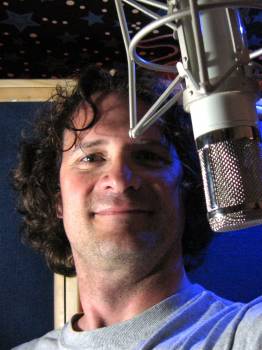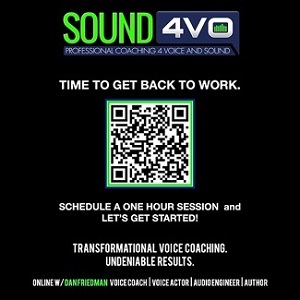|
A Great Voice Over Coach Is ... Your Ears! Learn To Listen
By Dan Friedman
Audio Engineer, Producer & Voice Talent Recently there was a post on a social media site that discussed voice over coaches. The talent (whom I do not know) wrote that he was discouraged by some comments that his most recent coach had made. At the time I write this, the post has 48 comments, with some very popular names in the industry weighing in. Getting some VO coaching is critical to your career, of course. A GOOD COACH WILL ... At a minimum, good coaches teach:
Many coaches offer additional instruction on other topics related to voice over, such as marketing, basic audio recording and audio editing. And coaches provide encouragement, direction and might even be able to get you a gig or two. APPRECIATE THEIR HONESTY Voice coaches can be many things, and their role and importance in your career can change as your career grows and progresses. The most important job of the coach is to be completely honest when evaluating your abilities and offering feedback. This feedback is important. HEAR IT YOURSELF But at some point, you have to learn to hear "it” for yourself. The truth of the matter is, you have the best coach with you at all times - your ears. Voice over coaches are indirectly trying to get every student to open their ears and truly listen. SUBTLE DIFFERENCES Learning to hear the differences and nuances in attitude, style, pacing, inflection, emphasis, amount of smile, etc. is, in my opinion, the real secret to doing voice over well. Almost anyone can learn to do these things with their voice if they are aware of what to do and practice doing it. However, being able to hear the subtle nuances of your delivery is what enables you to stop simply playing with words and allows you to become the communicator that every serious voice talent should work toward becoming. Coaching deliberately teaches the techniques that get the brain, mouth and voice working together to physically do what needs to be done. PIECE IT TOGETHER But many voice talent fall short by failing to truly engage their ears. This is one reason why so many voice overs are pieced together line-by-line by the engineers, whose job it is to use their ears every day. While this is common in today’s world of fast digital editing - and even clients have gotten comfortable working this way, this is not exactly how it is meant to be. You have two ears and one mouth to remind you to use your ears twice as much. TRUST YOUR EARS Record, read, playback, listen, adjust accordingly and do it over and over again. Learn to use your ears. Use them purposefully, and over time you will learn to trust them. You will know immediately what is working and what isn’t. You will learn to fine-tune and self-correct. ABOUT DAN ...
Dan Friedman is a voice talent who began as an audio engineer in 1994, working with live sound and then in radio and recording studios. He has been a producer with ProComm Voices for nearly 10 years, and since 2005, a voice talent with a growing list of of clients including radio and television campaigns. His comprehensive book, Sound Advice - Voiceover From An Audio Engineer's Perspective, provides an excellent foundation for understanding voice over audio and equipment.
Email: danfriedmanvo@hotmail.com
Web: www.Sound4VO.com
Sound Advice book: Click Here
|
|
|
For essential voice-over business strategies
On Michael Langsner's Voice-Over Roadmap Podcast
With Sean Daeley and Paul Stefano - check it out!
Email alerts to new VoiceOverXtra articles
As of the NEW website launch, 03/22/2012

 Note: The author recently published an excellent guide to voice over audio and equipment,
Note: The author recently published an excellent guide to voice over audio and equipment, 








Many thanks for this thoughtful article!
I began training to be a narrator after listening to over 1,000 audiobooks. That process taught me what they're supposed to sound like, but not how to do them. Audio engineers have a big advantage over the rest of us, because they get to hear so many samples! Like anything else, ear-training improves with practice.
Your concluding comments about how to train our own ears, fine tune, and self-correct are especially helpful. We all know when we've flubbed a word. (That's what pick-ups are for!) But often, odd phrasing and emphasis are only obvious in context. Listening to playbacks during the recording process almost always tells me, right away, what's working and what isn't -- because it either sounds like all of those books I've listened to, or it doesn't. I find that, in the long run, playbacks and adjustments save me time and improve my finished work.
Thank you also, Paul, for the reminder that we all have the capacity to fool ourselves. It's hard to be objective. Self-direction is difficult, and the best coaches are the ones who show us our blind spots.
Thanks to years of conditioning, we suffer from selective memory, selective hearing, selective eyesight and selective reasoning. This commonly leads to ‘confirmation bias,’ a tendency to validate and reinforce our personal prejudices, regardless of the evidence.
Studies have shown that, even if these beliefs are debunked, the discredited proof is filtered out as “irrelevant,” and we keep on clinging to our distorted version or reality. And if you strongly believe that this theory is utter hogwash, I have to thank you for proving my point.
A 2007 survey of over 3,000 people conducted by psychologist Richard Wiseman led to one conclusion: 88% of all New Year’s resolutions end in failure. Wiseman gave two reasons:
1. People are stubbornly set in their old ways
2. People lack willpower and self-control
That's exactly why even the best teams need a brilliant coach. Only the illustrious Baron von Munchhausen was able to drag himself out of the swamp by his own hair.
This doesn't mean we're utterly helples and ineffective. It just means that we usually are our own biggest blind spot and impediment to growth.